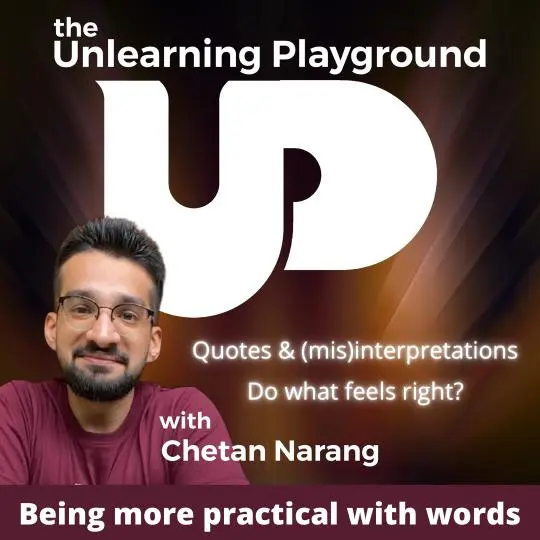Whatever is said or done is interpreted always, and misinterpreted almost always.
Chetan narang
Well, not almost always, but we do misinterpret others much more than we would want to be misinterpreted ourselves.
There is no substitute, after all, to honest conversations.
So much of our waking lives revolve around words that we barely get time to think about what is the right relationship to have with our own words.
We interpret everything – all the quotes we read, all the videos we watch, all the podcasts we listen, all the conversations we have, all the social media posts we consume – all of it passes through the mental models engrained in our minds.
The path from these interpretations being just interpretations to them becoming truths should be one we carefully travel, especially when it matters.
It is not these quotes that are limited, it is our interpretations of them that limit the world we see.
Join myself, Chetan Narang, in Episode 14 of The Unlearning Playground Podcast where I talk about how quotes, words and our own interpretations of them can limit us and our understanding of our world.

Check it out on your platform of choice.
Or listen on the custom player below
Yeah, quotes are great.
But have you ever caught yourself misinterpreting one to suit your own preconceived story?
That is the one of the most potent, generalised use of quotes in my opinion –
to take you to the realisation that you (mis)interpret words all the time.
We all have stories in our minds.
Stories about how the people around us are, stories about how people are in general, stories about how certain ‘kind’ of people are, stories about how the world is, and so on and on …
These stories help us in navigating the world, and do a good job about it.
A lot of times however, our own favourite and cherished stories limit us from seeing things as they actually are. Everything that reaches us passes through, and is coloured by these stories. No matter how brilliant the quote I just came across is – if the mental model it triggered in my mind is not based on truth, I would not be able to squeeze the nectar out of it.
This happens all the time around us doesn’t it?
I, for one, have noticed this happen a lot on social media – I would see someone share a quote or a clip of some wise words; and the interpretation of those words that made them worthy of a share for this person was just one that confirmed their already preconceived notions. Someone who is politically left-leaning would be moved by the same quotes that move a politically right-leaning person, and both of them would happily share the same words in their circles; assuming that the words they are sharing mean what they think they mean, and what they have always thought they mean.
All of this, like most truths that matter, is easier to see in others than it is to see in oneself. Because it is not comfortable to see your own thoughts being proven incomplete and biased. It’s like that powerful quote by Robert Pirsig in his beautiful book, Lila. Yes, the man wrote a book other than the Zen and the art of motorcycle maintenance. The quote goes like this:
It’s always the other person who’s ‘deluded.’ Or ourselves in the past. Ourselves in the present are never ‘deluded.’ Delusions can be held by whole groups of people, as long as we’re not a part of that group. If we’re a member then the delusion becomes a ‘minority opinion.’
Robert Pirsig, Lila
All said and done, I hope this creates a little curiosity in you to check out your own interpretations (and misinterpretations) of quotes. Catch yourself the next time you hear yourself say things like
“Yeah, this is nothing new.”
“Yeah, I know this already.”
“Yeah, so what?”
I’m not saying that these responses are always uncalled for. But be aware enough to see when you’re actually understanding something, and when you’re just substituting it by something you already ‘know’.
If whatever you read/hear immediately falls into buckets like
right/wrong
good/bad
agreed/disagreed
You might be missing out on what’s the Truth.




